You’ll often find tips about blocking online ads using the best ad blockers available when it’s about securing your online privacy. Wondering why is that?
Well, in today’s digital world, you are constantly bombarded with content, often unwanted. For example, on most websites, you will find tons of advertising media surrounding your desired information, such as in the banner at the top, within the content itself, or in the sidebars.
These ads may often display things you have zero interest in. They may even ruin your browsing experience by blocking your screen frequently. Wouldn’t it be annoying?
Just think of all the things you would feel while walking through your local city if you see advertisements everywhere telling you what you should buy or consume. Indeed, that will negatively affect your mental state, especially if you see negative ads.
While you can’t block such ads in real life, you can control them on the internet.
Advertisement blockers are one of the most acceptable ways to secure online privacy, reduce website clutter, and avoid malware ads.
In this article, we will look at various advertisement blocker options available. This list of top free ad blockers boasts a mixture of tested (and only highly effective) tools for Mozilla Firefox, Google Chrome, Safari, and more.
Top 5 best ad blockers – Quick list
In a rush to install the best ad blocker on your device right now? Here is a quick list of the top 5 you can use.
- Adblock Plus: best free ad blocker supporting non-intrusive advertising.
- Adguard AdBlocker: premium ad blocker ensuring thorough adblocking.
- AdLock: best for blocking in-app ads.
- NoScript: a free tool to block intrusive scripts.
- Poper Blocker: free ad blocker for annoying popups.
Why should you block online adverts?
Many people think of ads as a harmless marketing tactic. While it might be the case in the physical world, things are different online.
Precisely, online ads are much more intrusive and dangerous for several reasons.
Often, these ads use much more bandwidth, causing web pages to load much slower.
In most cases, they may even cover the content you are trying to see. Or worse, these ads trick you into clicking the fake download online.
Another concern is the increased privacy and online behavior monitoring associated with advertisements.
To make things more straightforward, here I elaborate on the key reasons why more and more people need adblocking software today.
Confidentiality
From a confidentiality point of view, online advertising is a nightmare.
Why? I hear you ask.
The short answer is that advertisements are usually delivered via third-party domains and contain complicated tracking.
The ad tracking software creates a unique user profile that includes your interests, location, browsing activity, age, family history, friends, etc.
Depending on your consumer profile, targeted ads will appear to you through the advertising networks of the sites you visit.
In other words, advertisements are like surveillance cameras continuously violating your confidentiality and privacy.
Performance
Advertisements can compromise the performance of your device by affecting processor consumption and bandwidth usage.
Research has revealed that advertisements can consume up to 79% of your mobile bandwidth.
You can dramatically improve page loading speed by using an insubstantial and flexible advertisement blocker.
Security
Another threat commonly associated with online ads is malware attacks. The development of malicious advertisements is alarming because they can harm your electronic devices by merely visiting a website or loading a webpage with such ads without even clicking on them.
Advertisements malware (also known as malvertising) can exploit security holes and can even take control of your devices.
The overview of adblockers’ types
Advertising blockers (also called “adblockers”) are computer programs that remove ads on the internet to improve the browsing experience. These tools prevent malware from infecting your device or browser alongside protecting your privacy.
There are different types of advertisement blockers depending on how they work. Below are a few of them.
- VPN with dedicated adblockers: Several VPN services include apps that defend you from adware. As VPNs can guard you against several types of tracking or monitoring, the adware will also have a tough time collecting data about you.
- Extensions: You can save your browser from adware by selecting one of the trusted third-party browser extensions. Many paid and free apps available today work with most web browsers.
- Browsers: Many web browsers incorporate adblocking software, which allows you to avoid adware effortlessly. Though some are relatively effective, they may have limited functionality compared to a third-party blocker.
- Router: A virtual router can be configured with a DNS filter that automatically blocks requests from servers that deploy tracking services or adware.
You can also combine several types of adblockers for optimal protection. Generally, advertising blockers create two types of filters:
- A “blacklist” for annoying ads that the user does not want to appear. Such adverts are those that occupy the entire screen and take time to close — or those that mimic other buttons and trick users into clicking by mistake.
- A “white list” in which the user can include the ads he wants to appear while browsing. In this way, you can continue to reward your favorite pages financed through advertising and advertisers who create non-invasive formats.
Adblocker scams to avoid
Thousands of internet users have been tricked into downloading fake adblocking extensions to date. Thus, it would be best if you watched out for adblocker scams before going with any add-on.
Besides invading your privacy, fake adblockers also secretly collect data about your browsing habits and may even change the behavior of your browser.
They will also try to trick you into downloading them by using names similar to or same as those of reputable adblockers. Therefore, ensure you are on the correct page before downloading such a tool.
Here are some of the names used by fake extensions in the past:
- Adblock Pro
- HD for YouTube
- Adblock Plus
- HD for YouTube
- uBlock Plus
- Webutation
- Superblock Adblocker
- AdRemover for Google Chrome
Top 14 best ad blockers – Detailed list
Are you fed up with the advertisements hindering you over the internet?
The good news is that blocking advertisements, once an art reserved for the most tech-savvy guys, has now become easier.
How? I hear you ask.
All thanks to the top-notch ad blocking extensions and services available today.
Without further ado, here are the 14 best ad blockers (most of these are free) to avoid popups, remove ads, and protect your privacy online:
1. Adblock Plus (free)
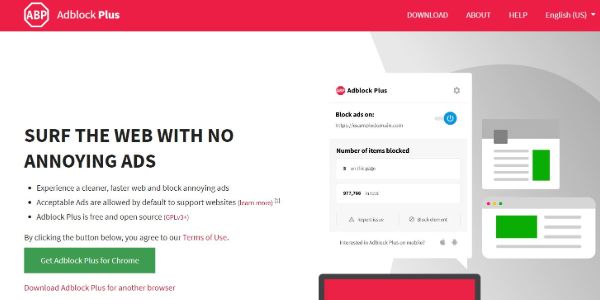
Adblock Plus is the most popular free adblocker. That’s because it favors safe advertising.
The tool only blocks invasive or potentially malicious ads. So, you will still come across certain advertisements unless you change the settings.
ADP works on Chrome, Internet Explorer, Firefox, Safari, Opera, Edge (still in beta, though), and Yandex browsers.
2. Adguard AdBlocker (paid, offers trial)
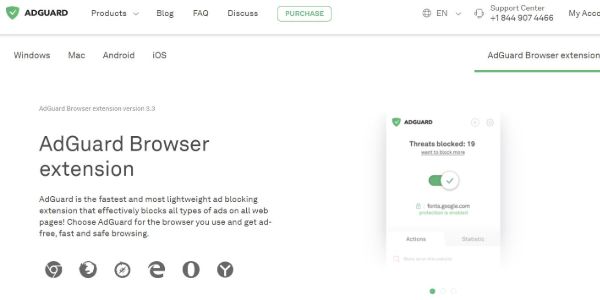
If you used and liked AdBlock Plus to block advertising, Adguard AdBlocker might also do the trick for you.
The user interface of this tool is slightly different, but the adblocking functionality is similarly effective. It blocks all types of advertising content that may appear on different websites.
This software is currently available for Mac, Android, and Windows.
Notably, this is a premium adblocker. However, you get 14 days to try it for free and decide if it is worth upgrading. The premium version of Adguard Adblocker costs around $25 for a yearly subscription.
3. AdLock (free + paid versions)

The AdLock extension is a free Chrome ad blocker that never asks users to donate or purchase against providing them with fast and secure web surfing.
Not only Google Chrome, but it is also unconditionally free for Safari.
AdLock also works on Android, iOS, Windows, and macOS for blocking ads in all of your applications, but you’d need to purchase it for most of those devices. Luckily, that costs $7.61 for the whole year.
Understandably, paid versions that work on Android and Windows devices offer more features than the free extensions provided by the company for Chrome and Safari browsers.
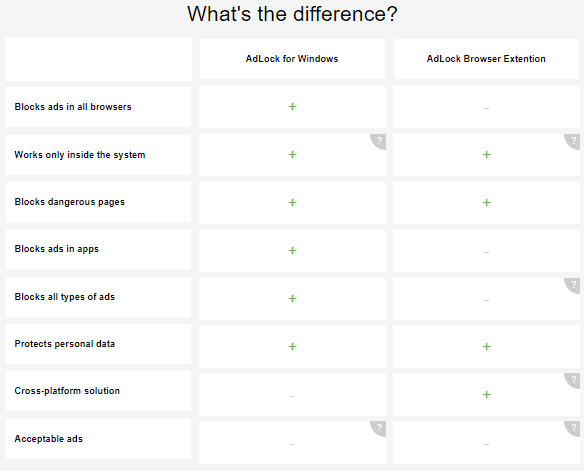
All in all, AdLock is a highly aggressive and powerful ad-blocking tool that boasts some advanced features, too.
One such advanced feature is whitelisting a site for showing ads. You can whitelist a website by going to “Settings > Whitelist.” You can also add some additional filtering parameters if you wish.
4. NoScript (free)

NoScript is a Firefox advertisement blocker that blocks scripts (as the name suggests).
It helps avoid every type of script from loading on the websites you visit: Java, Javascript, Flash, etc.
Also, you can allow some types of scripts for the sites you trust. All in all, if you are a Firefox user, NoScript will make your browser safer to use.
While testing this free ad blocker, I noticed one con: the service is a bit heavy by default, unlike my expectations.
5. Poper Blocker (free)

As the name suggests, Poper Blocker blocks popups and standard overlays on the sites you visit. With this totally free ad blocker, you only need to right-click on overlays to get rid of them.
Poper Blocker detects the popups on all the websites you visit automatically and blocks them without any work required by you. The add-on sends a notification in your browser every time it blocks a popup.
The extension also allows you to whitelist any website you wish. For that, you only need to hit the “allow popups” button while visiting your preferred website.
It is available only for Chrome. Though a Firefox version of this extension is available too, that’s developed by a different company. Only the name of both extensions is the same. If you are on Firefox, it is safe to try that one, too (that also is a good one).
6. AdAway (free, open source)
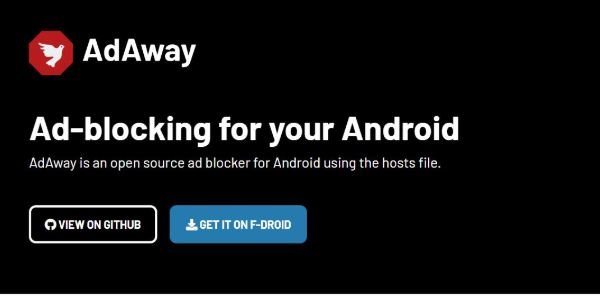
AdAway is a simple Android ad blocker that only works with rooted devices.
Although it is a simple application, it boasts some advanced features. For example, with AdAway Custom Sources, you can add your very own sources (of host files). It also allows users to apply custom rules where you can add exceptions to your blocklist, whitelist, and redirection rules.
Everything about this free Android adblocker is excellent except for one thing; it requires users to have their Android device rooted.
That is something we would never recommend you to do, so this single point makes AdAway a big NO-NO for me.
But I still wanted to list it as it’s a cool ad blocker for Android devices, and maybe if someone has got their Android rooted already for some other reasons, they might want to use it.
7. AdBlock (free)
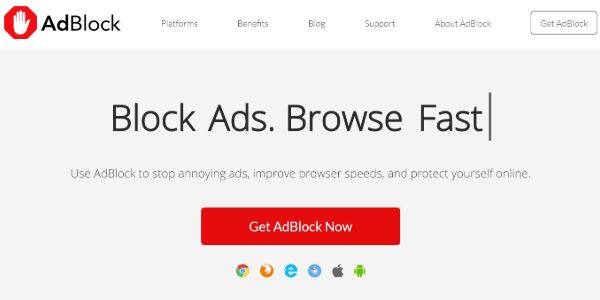
This top-notch ad blocker works on Chrome, Microsoft Edge, Firefox, iOS, and Android devices.
On Google Play and Apple Store, AdBlock is currently one of the most downloaded free ad blockers by users — and considered one of the best to block any advertisement.
It is worth noting that AdBlock does not have any relationship with Adblock Plus despite the substantial resemblance to its name.
AdBlock offers a wide range of features, where users can decide from the different options to use the default filters, subscribe to others, or create their own, among others.
That all will allow you to restrict the appearance of the ads and surf the internet faster; most importantly, in a much faster way.
This highly-trusted ad-blocking tool allows you to block annoying ads (including popups) and also blocks autoplay video and audio ads that we usually see on YouTube, Twitch, and Facebook.
8. uBlock-Origin (free)
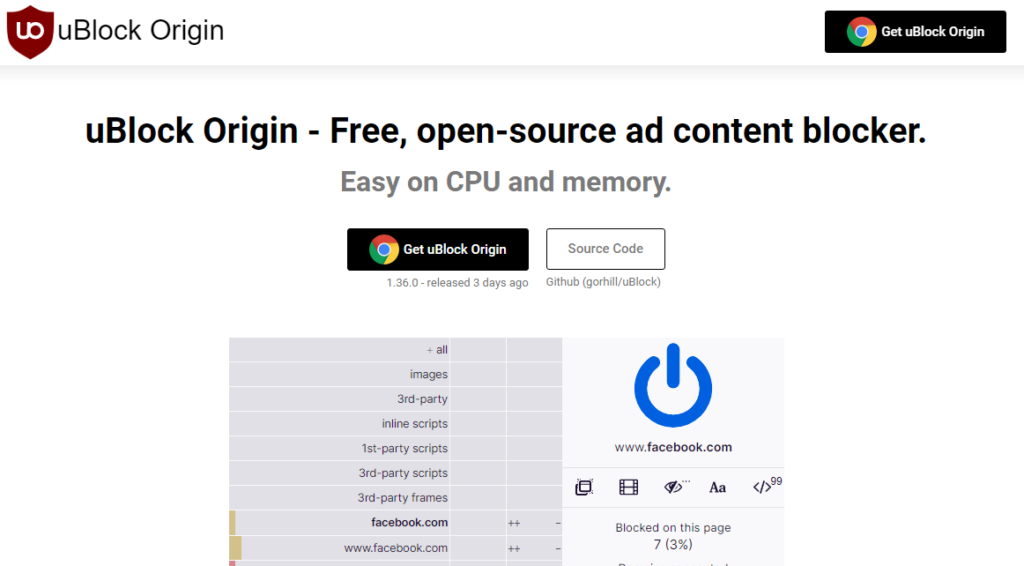
This extension is available for Chrome, Firefox, Microsoft Edge, and Opera — and is famous as the most lightweight adblocker. Also, during our tests, it demonstrated minimum usage of both the processor and the computer memory.
So I do not wonder anymore why it is one of the most downloaded adblocker (all because of its outstanding performance).
uBlock Origin has many filters where you can edit them yourself to block the type of content you want, whether from the banner, video ads, or popups, among others.
9. AdBlocker Ultimate (free + paid versions)
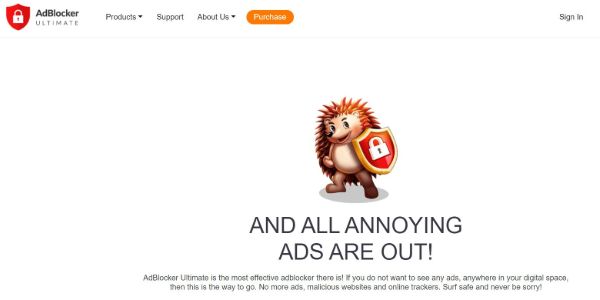
Staying true to its name, AdBlocker Ultimate is considered one of the best and most potent ad-blocker available today.
It is compatible with virtually all internet browsers and also has strict policies.
As for its functionality, it is one of the strictest in terms of aggressive ad-blocking technology. That’s why most users prefer this tool since it does not allow any advertisement to go through.
It ensures that you will not encounter any type of advertising content that can cause your browsing experience to be slower.
With this program, you can also avoid tracking your online activities as it enables users not to keep a browsing history.
That is a good option for those who do not want their movements on the internet to be seen (for any reason).
But, unlike many other blockers, AdBlocker Ultimate does not offer the possibility of allowing certain types of ads to appear as most of the other programs (of this type) do.
10. Ghostery (free)

It is yet another extension built with privacy in mind. Ghostery will help you escape (I mean block) any ads on the internet, including popups, other add-ons, banners, and flash, among others.
Since its launch in 2017, Ghostery has captured millions of downloads, which is probably because of the quality service it offers for free. This extension is available for Edge, Opera, Firefox, Cliqz, and Chrome.
11. Ad Muncher (free)

Currently, this ad blocker is competing with giants like Adblock Plus for the top position as far as the best free ad blockers are concerned.
It allows you to block ads on virtually all the browsers out there. And the best part is, it is free (yet an influence-free ad blocker).
Unlike most of the other advert blockers, Ad Muncher is a software that you need to install directly on the device (it is not an extension but an app).
With Ad Muncher, you can block advertisements in almost all web browsers, including Firefox, Internet Explorer, Google Chrome, Opera, Flock, Safari, Netscape, Avant Browser, and Maxthon.
This software has several filters, which you can deploy at your convenience, where you can filter specific addresses, java, background music, plugins, and wallpapers, among other contents of any web page.
12. 1Blocker (free)

This tool is designed to protect iOS devices from all the nasty advertisements and third-party tracking over the internet.
1Blocker is available only for iOS machines. However, it has been updated for Mac (Safari 10) recently.
Depending on your Apple device, you can download (and start using) it either from the normal App Store or Mac App Store for completely free.
13. HTTPS-Everywhere (free)

This is another top ad-blocking option that will help you block adverts that appears in different web browsers.
It is open-source and is available for Chrome, Opera, and Firefox.
Staying true to its name, the purpose of HTTPS Anywhere is to force websites into using the HTTPS connection as that is way more secure than using HTTP.
14. Privacy Badger (free)

Another tool developed by the very same non-profit parent organization, Electronic Frontier Foundation (EFF), that built the above-mentioned HTTPS Everywhere extension is Privacy Badger.
Privacy Badger is considered one of the best tools for maintaining your privacy as a whole alongside avoiding any type of ads online.
It is available for Firefox, Chrome, Opera, and Android (for that, you will need to download Firefox on Android).
On top of enabling you to block unwanted ads, it automatically detects the invisible trackers and blocks them.
Websites’ shady adverts quality and adblockers
No matter what browser you use, popup ads are one of the most significant inconveniences when you’re on the internet.
They can appear when you least expect it, and many out there try to trick you, making you believe that they are part of the website you are visiting.
Usually, popup ads seem innocent marketing, but their true intention is malicious. Popups may be responsible, among other things, for:
- Deploying spyware or malware
- Tracking your activities online
- Capturing your data
This can happen even without clicking on an ad since the malicious content gets installed while the page loads. That is why you should only visit the known sites.
The malvertising has increased due to the increase in popularity and frequency of use of laptops, computers, phones, tablets, etc.
The bigger the userbase gets, the more aggressive techniques the scammers would devise to make the most of it. Simple.
In 2017, Google removed 112 million ads that wanted to install malicious software, viruses, and trackers to record users’ activities online.
The number and frequency of these ads increase every year, and we are into 2022; you can imagine how dangerous the ads can be now.
In February 2018, Google added its very own advertisement blocker in the Chrome browser to avoid “sub-standard advertisement.”
But it made sure that all the Google-sourced advertisement from AdSense remained unaffected by the tweak in question.
Let’s face it; advertisement income is the primary source of profit for several websites.
The use of advertisement blockers resulted in a loss of 15.8 billion dollars for websites in the last couple of years.
Browsers with built-in ad-block
So, you are on an agreement to install extensions to block ads on your phone and computer? That is good.
But try the built-in adblocker already included in your browser, too. The best part is it is free!
Browsers with built-in ad-blockers (such as Google Chrome) have integrated technology that blocks ads that help you navigate faster.
Such a web browser will help you save time while browsing, as it loads pages up to 40% faster.
On top of avoiding annoying ads, blocking ads when browsing will allow you to save data if you have a limited data plan.
And when an ad blocker is built-in within a browser already, the surfing speed increases up to 80% compared to other browsers that do not have an adblocker and up to 45% compared to browsers that have an adblocking extension installed.
Final thoughts
In this age, adblockers have become the consumers’ best response to invasive advertisements that spoil their browsing experience and complicate web surfing.
If you understand what an ad blocker is and its critical role in the panorama of internet browsing, you might already have settled for one that suits your needs from the best ad blockers listed above.
Nothing is annoying for internet users than intrusive ads right in front of the content they are consuming. You finally are free from such trouble and ready to say goodbye to all the irritating ads online (once and for all).
For optimum results and better online privacy, you can try combining multiple top ad blockers (I use Adblock Plus and Privacy Badger together with a VPN).
If you care a little extra about your internet safety, you can also turn to secure browsers so that you stay protected online alongside succeeding in avoiding malicious adware.
FAQs
If you have a quality ad blocker installed (such as Adblocker Ultimate), it automatically blocks all the ads on your visited page.
No. Most advertisers have a pay-per-click system, so if you hide the ads, you stop supporting the website.
Based on my extensive tests, AdBlock Plus is the most valuable ads blocker software for Safari.
AdBlock and Adblock Plus are the best browser adblocking extensions for Firefox.
You can download NordVPN, Adblock Plus, or AdLock .apk for Android phones and install it following the instructions. But for iPhones, there is no way to block in-app ads except by using a network advertisement blocking device.
Opera has a default advertisement blocking feature. So, there’s no need for any extension, just switch it on in your browser settings and go ad-free.
Download a desktop application or install a browser extension. One free YouTube ads blocker that we can recommend is AdBlock.
Depending on your phone, you can block ads on it either by using ad blocking software such as AdBlock or by simply tweaking your smartphone’s security settings.
You can do it with Social Network Adblocker or AdBlock extension easily. Search for them in your browser add-ons store and install.
Featured Image via Pixabay.






